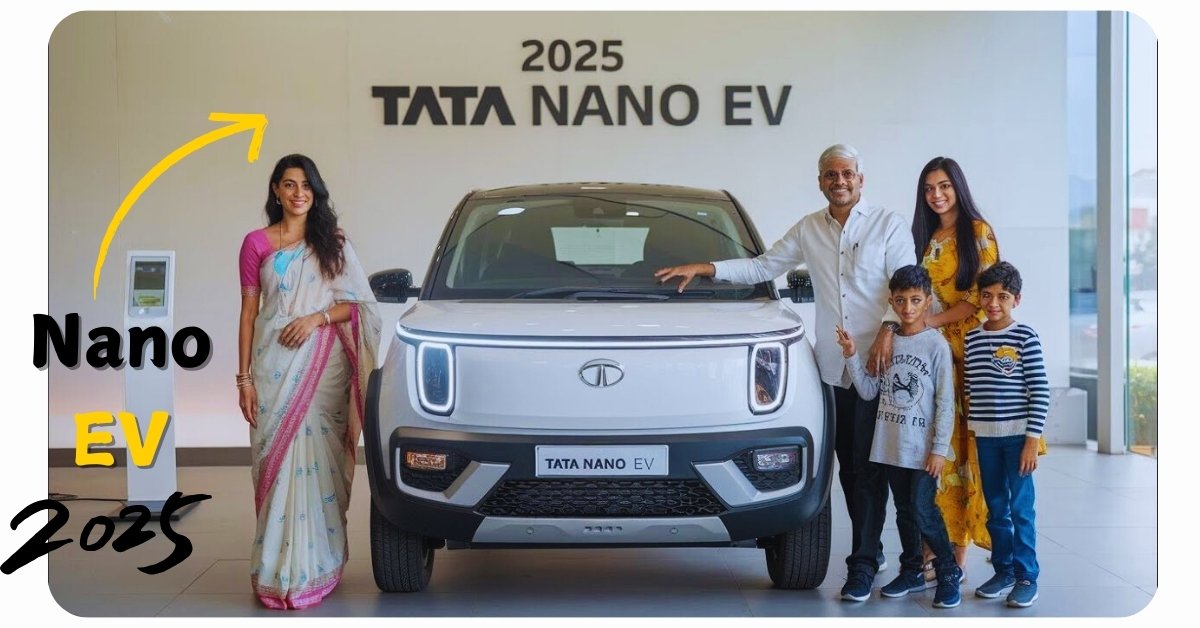January 13, 2025
2025 Tata Nano EV:- In an era where electric vehicles are becoming the norm, Tata Motors is set to bring back a beloved classic in a modern avatar. The Tata Nano EV, a new electric version of the world’s cheapest car, is making a grand comeback at a price point of 2 lakh rupees. This reincarnation of the Tata Nano represents a blend of affordability, sustainability, and innovative technology.
The original Tata Nano, envisioned by Ratan Tata, made its debut in 2009 with the promise of providing affordable four-wheeled mobility to millions of Indians. Although the car faced several challenges, the concept of an ultra-affordable vehicle remained compelling, especially as the automotive world shifted towards electric mobility.
A Visionary Concept
The idea of an electric Nano was conceived early on. In 2010, Tata Motors showcased a Nano EV concept, hinting at the company’s future direction. This concept featured a range of 160 kilometers and could accelerate from 0-60 km/h in under 10 seconds, which was impressive given the vehicle’s size and target price point.
The Development of Neo EV
In 2015, the Nano EV concept began to take shape through a collaboration with Jayem Automotives, resulting in the Neo EV. This model aimed to make the Nano a viable electric vehicle for urban India. Key features of the Neo EV included a rear-mounted electric motor, a 17kW battery pack under the front seats, and a range of approximately 200 kilometers. Despite these advancements, the Neo EV faced significant regulatory, market, and infrastructural challenges.
The Electra EV: Reviving the Dream
In 2022, Electra EV reignited interest by retrofitting a Tata Nano with an electric powertrain, delivering it to Ratan Tata. This project demonstrated the feasibility of converting existing vehicles to electric power, highlighting the potential of the Nano EV.
Changing Market Dynamics
The electric vehicle market in India has evolved considerably. Entry-level EVs now start at around 7 lakh rupees, with models like the MG Comet EV and Tata Tiago EV leading the affordable segment. Consumers expect better range and more features from their electric vehicles, including ranges of 200-300 kilometers, touchscreen infotainment systems, and advanced safety features.
The Case for Tata Nano EV
Despite the challenges, there are strong reasons why a Tata Nano EV could succeed:
- Urban Mobility Solution: Its compact size and efficiency make it ideal for navigating congested urban areas.
- First-Time Car Buyers: An affordable EV could appeal to two-wheeler users looking to upgrade to a car.
- Last-Mile Connectivity: It could be used for last-mile delivery services and as a short-distance taxi.
- Symbolic Value: An electric Nano could symbolize India’s progress towards sustainable mobility.
- Technological Showcase: It provides a platform for showcasing Tata’s EV technology in a compact and efficient package.
Potential Specifications for the New Nano EV
If revived, the Nano EV might offer:
- Battery: 15-20 kWh lithium-ion pack
- Range: 200-250 kilometers
- Motor: 30-40 kW electric motor
- Charging: Support for DC fast charging (0-80% in under an hour)
- Features: 7-inch touchscreen infotainment, digital instrument cluster, regenerative braking, connected car technology
- Safety: Dual airbags, ABS, EBD, rear parking sensors
- Price Target: 5-6 lakh rupees
Challenges to Overcome
To succeed, the Nano EV must address several key challenges:
- Cost Management: Balancing modern EV technology and safety features with the target price.
- Brand Perception: Overcoming the mixed legacy of the original Nano.
- Competition: Differentiating from established players in the affordable EV segment.
- Profitability: Ensuring a sustainable business model at a low price point.
The Road Ahead
As of 2025, Tata Motors has not officially announced plans to revive the Nano as an EV. However, the company’s commitment to electric mobility is evident with successful models like the Nexon EV and Tiago EV already in the market. Possible future directions include developing a new ultra-compact EV, reviving the Nano brand for affordable EVs, or focusing on larger, more profitable segments.
Conclusion: A Dream Worth Pursuing
The Tata Nano EV symbolizes ambition, innovation, and unrealized potential. While the vision of an ultra-affordable electric car remains unfulfilled, the concept continues to inspire. As technology advances and markets evolve, the Tata Nano EV might yet become a reality, reshaping urban mobility in India and beyond. The journey of the Nano EV serves as a reminder that no idea is too small to make a big impact.






